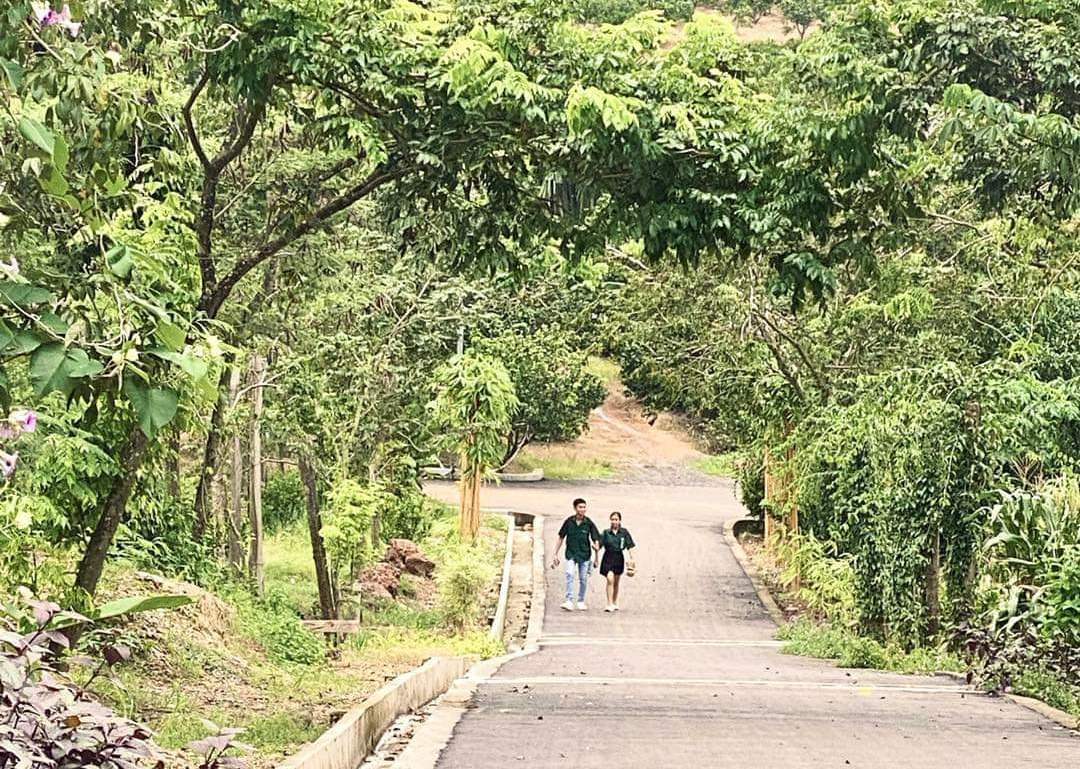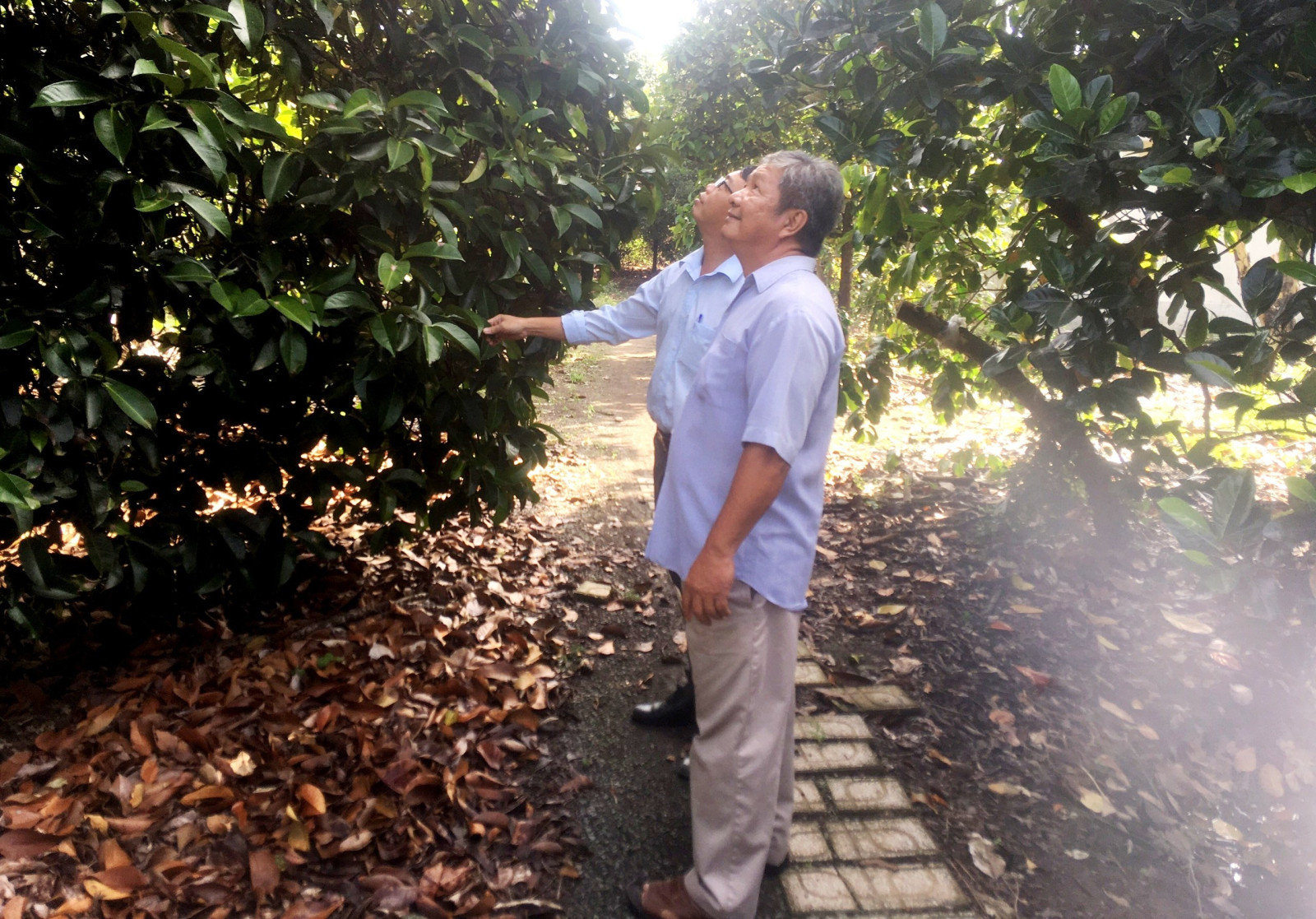Breathe a rural spirit into ecotourism
North Tan Uyen are filled with Dong Nai and Be rivers, and famous for being the largest citrus-growing area in the province. Specialties, like oranges, tangerines and pomelos, have become the soul of this local agriculture. Many farms and orchards here have integrated their products into experiential tourism, helping visitors to eye the actual farming work, understand a little about the daily life of farmers.

Ecotourism improves product quality, promotes agricultural specialties to attract tourists. In photo: Visitors enjoy visiting and experiencing fruit picking at Sol Reatreat Farm
Breathe a new life into agricultural products
Being likened to a little Da Lat, Hieu Liem commune is potential because it gathers famous farms attracting investment for tourism development. Limitless expanses of orchards creates a charming landscape. Especially, there is Sol Reatreat farm, which has been well-known to many locals and surrounding areas, for its green-skinned pomelo, herbal shampoo, handmade soap etc.
Nguyen Thi Xuan Thu, the owner of the farm, happily talked about the birth of this experiential ecotourism model: “In 2014, we invested in a citrus farm in Chanh Hung hamlet of Hieu Liem commune to grow pomelo, then oranges and tangerines. In 2017-2018, when the prices of citrus products went down, we established Sol Reatreat farm, and opened a few new services, such as sightseeing tours, experiential tours to immerse into rural life”.
Pham Thanh Thuy, who lives in Phu Giao district, shared her feelings after visiting Sol Reatreat farm: “At Sol Reatreat Farm, my family and I are truly immersed in nature, getting rid of all the stress and worries of daily life. The feeling of being transported to the orchard by tram, directly picking ripe fruits, and enjoying specialty fruits is very interesting.”
While North Tan Uyen scores because of specialty citrus fruit trees, Thuan An makes tourists unforgettable with its famous mangosteen seasons. The unmistakable sweetness of Lai Thieu mangosteen is the crystallization of soil and the laboring hands of farmers. These specialty fruit gardens are concentrated mostly in An Son commune, Lai Thieu, Hung Dinh, Binh Nham and Vinh Phu wards.
Unlike citrus fruit trees that produce all year round, Lai Thieu mangosteen has only one season, starting from May and through June, when the whole orchard region is fully ripe. Taking advantage of local strengths, farmers with large orchards have built an eco-tourism zone, in which many cooperatives in communes and wards connect with each other to form tourist stops. Visitors may experience fruit picking at gardens, enjoy dishes made from mangosteen, such as mangosteen chicken salad.
Every time the mangosteen season comes, the orchard of Nguyen Van Doi in Hung Tho neighborhood of Hung Dinh ward is always crowded with tourists. Doi said: “The family has more than 5,000m2 of gardens growing specialty fruit trees such as mangosteen, durian, strawberry, jackfruit, and bonbon. We are an ecotourism garden with about 10 huts for dining, relaxing and fruit picking.
Nguyen Thi Oanh, a tourist from Ho Chi Minh City, shared: “I have heard about Lai Thieu mangosteen for a long time. In the peak season, I always go to orchards to buy Lai Thieu mangosteen, enjoy dishes made from mangosteen. I am attracted by the authentic taste of Lai Thieu mangosteen, and by the simplicity of the people here to visitors.
Changes thanks to tourism development
Urbanization is increasingly driving people away from nature. Therefore, tourism combined with agriculture is currently being chosen by many tourists as a new experience. This form of tourism makes an important contribution to the local socio-economic development. Where tourism develops, the appearance of local urban and rural areas is improved, cleaner and more beautiful, and people's lives are markedly heightened.
In Hieu Liem commune, farmers used to plant Melaleuca trees, and their lives were poor. The pace of life here was slow, evenly, idly with the sad and quiet features of the countryside. The same-color life of local folks would not change if there was no spectacular breakthrough because of the transformation of crop structure. Hieu Liem is now bustling with fruit crops blooming on gentle, winding hillsides, embracing a countryside. Especially, the development of ecotourism has brought visitors and tourists here, contributing to the facelift of this countryside.
Or like Thuan An, without famous specialty fruit gardens, it will not attract tourists. The urbanization here is putting mangosteen gardens at risk of disappearing. Ecotourism combined with orchards is one of the measures to recover the Lai Thieu mangosteen brand, which is a motivation for farmers to cling to this land and keep their gardens. However, for the ecotourism to develop effectively and sustainably, the whole political system needs to be involved.

Famous Lai Thieu mangosteen orchards attract visitors.
Currently, localities with strengths in agriculture and specialty orchards want to develop eco-tourism in a professional manner, but there are still many difficulties and shortcomings.
Mai Duc Quy, Chairman of Hieu Liem commune People's Committee, said: “Exploiting the potential and promoting the strengths of agricultural tourism is a long-term, fundamental and delicate job. In particular, the design and construction of suitable, feasible and attractive products is the top task that tourism businesses are aiming for. Currently, farms in this commune are applying eco-tourism, combining visiting fruit orchards and displaying local products. However, due to the land mechanism, the construction of new tourism models is only small and fragile”.
In fact, the development of ecological agriculture in association with ecotourism at any level is an important prerequisite for building livable countryside. For the peri-urban areas, the development of agriculture, in addition to improving living standards for people in rural areas, has an important task of becoming the "green lung" of the inner city.
Ecotourism models have helped promote products and honor local culture and traditions. These models contribute to creating jobs for local workers, develops the locality in a new direction, creates opportunities to become attractive destinations.
Reported by Tien Hanh - Translated by Ngoc Huynh

